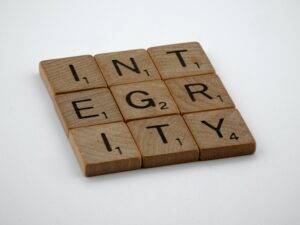Personal integrity refers to the quality of being honest, truthful, and having strong moral principles. It involves adhering to a set of values and principles that guide your actions, decisions, and behaviour. Personal  integrity also involves taking responsibility for your actions and being accountable for the consequences.
integrity also involves taking responsibility for your actions and being accountable for the consequences.
Commercial integrity, on the other hand, refers to the ethical behaviour and practices of businesses and organisations. It involves conducting business in an honest, transparent, and fair manner, with respect for customers, employees, suppliers, and other stakeholders. Commercial integrity includes adherence to legal and regulatory standards, as well as industry best practices and ethical codes of conduct.
Both personal and commercial integrity is important for building trust, maintaining relationships, and achieving success in personal and professional endeavours. They are essential for creating a culture of honesty, trust, and respect, which is critical for building strong and sustainable businesses and communities.
Combining personal and commercial integrity to create a unified business  approach to customer relations and needs is a goal we aim at. In fact, businesses that prioritise both personal and commercial integrity are more likely to build long-term relationships with their customers, and in turn, create a loyal customer base. Businesses can demonstrate personal integrity by being open and transparent with their customers about their products, services, and business practices. This includes being upfront about pricing, timing, and potential issues or risks. A perfect example in our trade is locksmiths that charge for a callout although initially, they advertise otherwise.
approach to customer relations and needs is a goal we aim at. In fact, businesses that prioritise both personal and commercial integrity are more likely to build long-term relationships with their customers, and in turn, create a loyal customer base. Businesses can demonstrate personal integrity by being open and transparent with their customers about their products, services, and business practices. This includes being upfront about pricing, timing, and potential issues or risks. A perfect example in our trade is locksmiths that charge for a callout although initially, they advertise otherwise.
Respecting customer privacy is not only a legal requirement but also a demonstration of personal integrity. Businesses can demonstrate commercial integrity by ensuring that customer data is kept secure and not misused. Providing excellent customer service is another way of demonstrating both personal and commercial integrity. By listening to and addressing customer needs and concerns, businesses can build trust and establish long-term relationships with their customers.
Following ethical business practices is essential for demonstrating commercial integrity. This can include complying  with legal and regulatory standards, treating employees fairly, and being socially responsible. By combining personal and commercial integrity, businesses can create a customer-centric approach that values honesty, transparency, and ethical behaviour. This approach can help businesses build solid and long-lasting relationships with their customers, and ultimately lead to success in the marketplace.
with legal and regulatory standards, treating employees fairly, and being socially responsible. By combining personal and commercial integrity, businesses can create a customer-centric approach that values honesty, transparency, and ethical behaviour. This approach can help businesses build solid and long-lasting relationships with their customers, and ultimately lead to success in the marketplace.
Commercial integrity is important for both small and medium-sized enterprises (SMEs) as well as large corporations. In fact, SMEs can benefit greatly from prioritising personal and commercial integrity in their business approach. For SMEs, personal integrity can be demonstrated by building relationships with customers based on trust and transparency. This can involve being honest and upfront about the products and services offered, as well as the business practices followed. Providing excellent customer service, responding promptly to customer inquiries, and delivering products and services on time can also demonstrate personal integrity. SMEs can establish a strong reputation for honesty, transparency, and ethical behaviour. This can help them to build a loyal customer base, attract and retain talented employees, and ultimately grow their business over the long term.
Respect for customer property and privacy.
Here are a few ways in which prioritising personal and commercial integrity can help your business stand above your competitors:
- Building customer loyalty: When customers trust and respect your business, they are more likely to become loyal customers who return to your business time and time again. This can help you to stand out above your competitors who may not prioritise personal and commercial integrity.
- Attracting new customers: Word-of-mouth recommendations and positive reviews are powerful tools for attracting new customers. By prioritising personal and commercial integrity, you can generate positive reviews and recommendations from satisfied customers, helping you to attract new business.
- Establishing a positive reputation: When your business is known for its honesty, transparency, and ethical behaviour, you can establish a positive reputation in the community. This can help to differentiate your business from competitors who may have a less positive reputation.

- Demonstrating professionalism: By prioritising personal and commercial integrity, you can demonstrate professionalism and expertise in your field. This can help you to stand above competitors who may not prioritise these values.
Overall, prioritising personal and commercial integrity can help your business to differentiate  itself from competitors, build customer loyalty, and establish a positive reputation in the community. By demonstrating honesty, transparency, and ethical behaviour, you can set your business apart and stand above your competitors in the eyes of customers.
itself from competitors, build customer loyalty, and establish a positive reputation in the community. By demonstrating honesty, transparency, and ethical behaviour, you can set your business apart and stand above your competitors in the eyes of customers.
I would say that personal integrity should come first before business ethics. Personal integrity involves an individual’s commitment to honesty, transparency, and ethical behaviour in all aspects of their life, not just in business. It is a fundamental aspect of one’s character and values.
